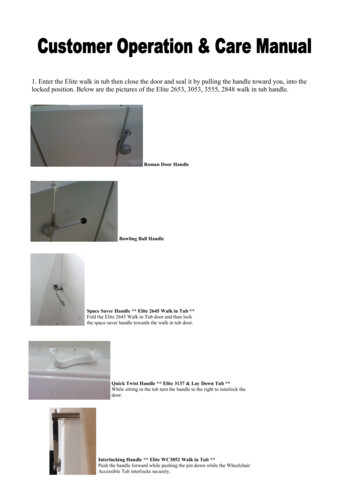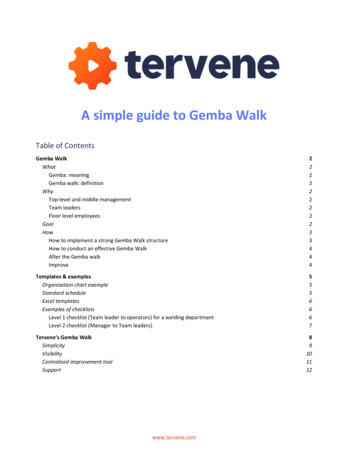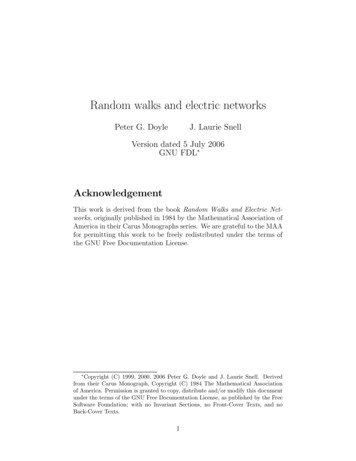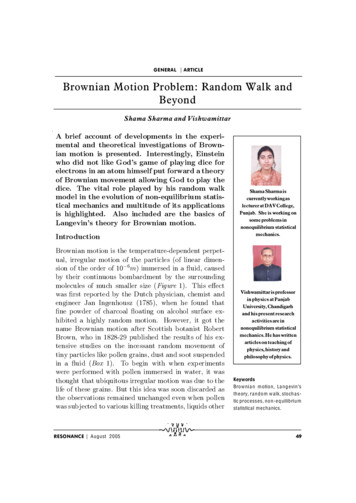
Transcription
Willing to Walk on Water is a practical and profound invitationto all who hesitate on the shores of the miraculous. Notonly is this book engaging, it’s empowering. You will beencouraged by stories from Caroline’s life and the lives ofso many others who consistently make a difference to thebeloved broken. Read and believe that your life will open upand touch thousands.Lisa BevereAuthor and speaker; cofounder of Messenger InternationalIn the face of staggering statistics of hurt and pain in theworld, Caroline Barnett helps us see that we are part of God’sanswers to the world’s problems. Be inspired. Step out in thedirection of God’s calling in your life. Be willing to walk onwater.Steven FurtickLead pastor of Elevation Church; author of the New York Timesbestseller Greater
STEP OUT IN FAITH AND LET GODWORK MIRACLES THROUGH YOUR LIFEAn Imprint of Tyndale House Publishers, Inc.
Visit Tyndale online at www.tyndale.com.Visit Tyndale Momentum online at www.tyndalemomentum.com.TYNDALE is a registered trademark of Tyndale House Publishers, Inc. Tyndale Momentum and theTyndale Momentum logo are trademarks of Tyndale House Publishers, Inc. Tyndale Momentumis an imprint of Tyndale House Publishers, Inc.Willing to Walk on Water: Step Out in Faith and Let God Work Miracles through Your LifeCopyright 2013 by Caroline Barnett. All rights reserved.Cover photographs are the property of their respective copyright holders and all rights are reserved.Photograph of woman taken by Stephen Vosloo Tyndale House Publishers, Inc.; boat seraficus/iStockphoto; water Andrew Johnson/iStockphoto; water Dean Turner/iStockphoto.Cover typography: The Fell Types are digitally reproduced by Igino Marini.www.iginomarini.com.Author photograph taken by Tiffany Angeles of Unlimited Style Studios, copyright 2011.All rights reserved.Designed by Ron KaufmannEdited by Bonne SteffenPublished in association with the literary agency of Fedd and Company, Inc., doing businessat PO Box 341973, Austin, TX 78734.Unless otherwise indicated, all Scripture quotations are taken from the Holy Bible, New LivingTranslation, second edition, copyright 1996, 2004, 2007 by Tyndale House Foundation. (Somequotations may be from the NLT, first edition, copyright 1996.) Used by permission of TyndaleHouse Publishers, Inc., Carol Stream, Illinois 60188. All rights reserved.Scripture quotations marked NIV are taken from the Holy Bible, New International Version, NIV. Copyright 1973, 1978, 1984, 2011 by Biblica, Inc. (Some quotations may be from theprevious NIV edition, copyright 1984.) Used by permission of Zondervan. All rights reservedworldwide. www.zondervan.com.Scripture quotations marked The Message are taken from The Message by Eugene H. Peterson,copyright 1993, 1994, 1995, 1996, 2000, 2001, 2002. Used by permission of NavPressPublishing Group. All rights reserved.Scripture quotations marked NKJV are taken from the New King James Version. Copyright 1982 by Thomas Nelson, Inc. Used by permission. All rights reserved.Scripture quotations marked KJV are taken from the Holy Bible, King James Version.Library of Congress Cataloging- in-Publication DataBarnett, Caroline.Willing to walk on water : step out in faith and let God work miracles through your life /Caroline Barnett, with A.J. Gregory.pages cmIncludes bibliographical references.ISBN 978-1-4143-7229-7 (pbk.)1. Faith. 2. Trust in God—Christianity. 3. Fear—Religious aspects—Christianity. 4. Churchwork. I. Title.BV4637.B298 2013248.4—dc232012049127Printed in the United States of America197186175164153142131
ContentsIntroduction ixPa r t I : DiscoveringC h a p t e r 1 Willing 3C h a p t e r 2 What’s Your Trigger? 23C h a p t e r 3 Serving and the Realities ofC h a p t e r 4 Look Long Enough 55C h a p t e r 5 Walk with Confidence 79Life 39Pa r t I I : ConqueringC h a p t e r 6 The Fear of Being Unworthy 101C h a p t e r 7 Not Willing to Sink 117C h a p t e r 8 Your Motivating Factor 133C h a p t e r 9 Our Wants vs. God’s Wants 155Pa r t I I I : DoingC h a p t e r 1 0 The You in Serving 171C h a p t e r 1 1 The Good Kind of Fear 195C h a p t e r 1 2 The Power of One 211Acknowledgments 223Discussion Guide 225Notes 233About the Authors 237
IntroductionI am, by nature, a shy person who is perfectly content serving in the background. I never had a desire to speak publiclyor preach from a pulpit. In fact, I ran from such things for thefirst ten years I was in f ull- time ministry. I wanted to throw upwhenever Matthew, my husband, asked me to stand up frontand simply greet the congregation. Once on stage, I wouldtremble like an exercise Shake Weight.But not anymore. Now I can stand confidently in front of acrowd of people to tell my story or share God’s message.The change didn’t happen overnight. But it did require asimple understanding of God’s plan for me. I had to stand andspeak to others in order to do the work I knew He was callingme to do in my community. And I was willing to do whateverit took.It is with such willingness that I approach my ministry today.I am humbled by how God has used me and countless others tomake the Dream Center a place where lives are changed for Hisglory. I am humbled by how He has blessed my own life. Thesewere the driving factors behind my desire to write this book.What I’ve learned is that once we make ourselves availableto God, we can make a difference in the world’s brokenness (noix
W i l l i n g to Wa l k o n Wat e rmatter how large or small the problem we take on). When weact within God’s plans for our lives and are open to taking arisk, we can make a positive impact on social injustice throughservice.I didn’t always think of service and social justice this way. Aswith most things, God had to open my eyes to see the connection between my life’s work and His work. Even though I hadbeen in ministry for years, I always assumed that our best effortswould only scratch the surface of the problems in our communities and in the world. The problems were just too big. Manytimes I felt like I was trying to save a sinking ship by scoopingout the water one Dixie cup at a time.I had no expectation or hope that the work I did alongsideothers could eliminate certain social injustices. I couldn’t seethat I was, in fact, a part of God’s answer to the world’s problems. And then God began to teach me about Himself and Hispurpose for my life. I began enlisting supporters for the DreamCenter’s women’s ministry. What God had put on my heartto accomplish needed an army to make it happen. And sureenough, just over five years later, what our women’s ministryhas accomplished is remarkable. You’ll read about this amazingride throughout this book.One of the key stories from the Bible that God used to prepareme is found in Matthew 14. Jesus’ disciples are caught in a stormin the middle of a lake, fearfully battling strong winds, waves, andrain. Then Jesus shows up in a most unbelievable way.About three o’clock in the morning Jesus came towardthem, walking on the water. When the disciples saw himwalking on the water, they were terrified. In their fear,they cried out, “It’s a ghost!”x
C a ro l i n e B a r n e t tBut Jesus spoke to them at once. “Don’t be afraid,” hesaid. “Take courage. I am here!”Then Peter called to him, “Lord, if it’s really you, tellme to come to you, walking on the water.”“Yes, come,” Jesus said.So Peter went over the side of the boat and walked onthe water toward Jesus.M at t h e w 1 4 : 2 5 - 2 9Even though he is terrified, Peter takes Jesus at His word andliterally walks out his faith with courage— courage to climb outof the boat. I feel God wants us to do the same thing. He wantsus to face our fears and do the seemingly impossible. What itrequires is desire and availability.In his description of the same scene, the Gospel writer Markadds a stunning piece of information. He recounts that Jesus“saw that they [the disciples] were in serious trouble, rowinghard and struggling against the wind and waves. About threeo’clock in the morning Jesus came toward them, walking onthe water. He intended to go past them” (Mark 6:48, emphasisadded). As I meditated on this passage I couldn’t get the sentence “He intended to go past them” out of my mind.Jesus knew the disciples were in trouble. And yet althoughthey struggled in the storm, none of them cried out to Him forhelp. As they unsuccessfully scuffled with the elements, pittingtheir puny human efforts against raging winds and crashingwaves, one thing was clear: they couldn’t do it on their own.They weren’t strong or capable enough. The storm overpoweredthem. In His mercy, Jesus moved closer to them. But He waiteduntil they called out to Him before He intervened. Had they notcried out for His help, I believe He would have walked past them.xi
W i l l i n g to Wa l k o n Wat e rGod Wants to Use YouThis walking- on- water illustration is applicable to us today.God knows the world is in trouble; the news is full of it everymorning. If you’re like me, when you hear about people inneed, you deeply desire to get involved or take a stand. But werarely act on those feelings, right? When we hear stories about modern- day slavery, sex trafficking, hunger issues, homelessness, or child abandonment, do we stop and say to God, “Showme how to solve this problem”? No, we don’t.But we should.God wants to use us. However, He won’t force ministry ora life of service on anyone. What He will do is partner with usand make it possible for us to find solutions to the problemsplaguing our communities the world over. We just have to bewilling to do the work. We can get it done if we trust God andfollow His plan.I believe if every Christian in the world were willing tomake a positive change, we would make a significant impactin remedy ing and mending the brokenness that runs rampantin our local and global communities. The numbers are in ourfavor.According to the most recent Atlas of Global Christianity,there are 2.2 billion Christians (that’s a third of the world’s population) and 4,850,000 congregations in the world.1 With anarmy this large, is any problem insurmountable? Some peoplemay look at the statistics and say it is. The Food and Agriculture Organization of the UnitedNations estimates that a total of 925 million people inthe world go hungry.2 Every day almost 16,000 childrendie from hunger- related causes.3xii
C a ro l i n e B a r n e t t An estimated 12 to 27 million people are caught in someform of slavery. Between 600,000 and 800,000 people inthe world are victims of human trafficking.418.5 million children around the world have no parentalcare.5No matter how overwhelming the amount of suffering ornumber of people in need all over the world, I believe thatwe, the Christian army, led and empowered by the Creator ofthe universe, can overcome these atrocities. Sure, it will takeeffort. It may take getting involved in the government’s effortsor galvanizing a team of people or starting an organization. Itmay mean joining forces with the many Christian organizations around the world that have already started conqueringthese issues. It may require something as simple as sending afew dollars to a charity or knocking on the door of someone inyour neighborhood who needs help. But all it initially requiresis your willingness.Lasting RewardsFor me, living my life with eyes and heart open to God’sleading has brought fulfillment and joy. It has deepened andincreased my faith. It has helped me focus less on my insecurities and on what I lack, and more on Jesus and what He cando through me. It has taught me about the love of God ona personal level. And it has resulted in countless miracles forthose we have reached.I know God has the same desire for your life. He wants youto change the world and make a strong impact in the particulararea of injustice that speaks to your heart, whether it’s helpingthe poor, feeding the hungry, adopting a child, preaching toxiii
W i l l i n g to Wa l k o n Wat e rthe lost, healing the sick, mentoring a troubled youth, helpingout a single mother, or teaching basic life skills to someone whoneeds them.It doesn’t matter who you are or what you do. Whetheryou’re a pastor, a “domestic engineer,” a student, or a CEO, Godwants to use your willingness to do great things simply becauseyou are His child and it’s your responsibility to help to run thefamily business. He wants to ignite in you a passion to startdoing something about the brokenness in the world.My hope is that after reading this book, you will becomeconvinced that you are part of the miracle God is looking for tohelp change the world. I pray that whatever has held you backfrom taking that first step of action to walk on water— whetherlies, insecurities, doubts, or f ears— will be brought to light andshattered.I’ve divided the book into three parts. I begin with my ownjourney into ministry and how God has helped me understandand define my missions for His Kingdom. Then we’ll look atthe roadblocks that cause people to hesitate to serve, and I’llsuggest ways to get past them. Finally, I’ll share several lessonsthat I have learned over the past ten years and how they couldbenefit you. Hopefully the stories, Scripture, and practical ideaswill help you identify your unique passion for service and clarifywhat God asks of you.Before getting started, consider these questions:Do you think you’re too inexperienced to makea difference?Do you think you’re too busy to make a timecommitment? Does even considering it make younervous?xiv
C a ro l i n e B a r n e t tDo you think you’re past your prime and these issuesare best left to a younger generation?Do you feel you lack the necessary skills, education,or network to relieve social injustices?If you answered yes to at least one of these questions, I hopeyou’ll continue reading so God can begin to speak to your heart.When you couple your willingness to walk on water with God’sdesire to perform miracles in people’s lives, an exciting and fulfilling future awaits you.Ready to start walking?Caroline Barnettxv
Part IDiscoveringPreach the gospel at all timesand if necessary use words.F r a n ci s o f A s s i s i
Chapter 1WillingI was hungry, and you fed me. I was thirsty, and you gave me a drink.I was a stranger, and you invited me into your home.I was naked, and you gave me clothing. I was sick, and you cared for me.I was in prison, and you visited me.M at t h e w 2 5 : 3 5 - 3 6I couldn’t help but notice their eyes— extremely made up,but empty. These scantily clad young women were selling theirbodies on Sunset Boulevard in Hollywood. It seemed as if theyhad already sold their souls.I had moved into the Dream Center as a full- time volunteerin the beginning of 1997, a few months after I turned eighteen.I wanted to focus on ministries that pulled at my heartstrings,so I volunteered on many different outreaches to find the rightfit. I had heard about the prostitution outreach and wanted tosee what that was like. The team headed to the streets everyFriday and Saturday night. Volunteers met at the Dream Centerparking lot at midnight to get instructions from the leader aswell as an overview of what to expect, and then the team woulddrive toward Sunset Boulevard. Once there, they would spenda few hours praying with and encouraging the prostitutes.I went on my first outreach a month or so after I moved oncampus. There were about sixteen of us paired up, within sightof each other. It was 2 a.m. and the “night shift” was in full3
W i l l i n g to Wa l k o n Wat e rswing. As police sirens blared in the distance, the prostitutesleaned provocatively against streetlights or slowly cruised thesidewalks looking for their next trick of the night.Our team, consisting of men and women, spread out to talkto as many of the women as we could. We handed out rosesand told them they were beautiful and that God loved them.Some politely smiled, while others rolled their eyes, their heartshardened by years on the streets. I realized that they were numbto the possibility of another kind of life. How could I convincethem they were worth so much more? How could I make themunderstand they had a loving Creator who could heal their hurtsand give them a future they could look forward to?I started talking to one of the prostitutes and told her about theDream Center and the opportunity she had to get off the streets.After leaving her with a flyer with more information about ourprogram, I walked farther down the block and glanced towardthe street. A car approached, slowing down right alongside me.The driver leaned over, hungrily peering out of the frontpassenger’s window. He assumed I was one of the working girls.We stared at each other for a second. He didn’t say anything,just stared me up and down. The evil that washed over his face— the lust, the insatiable appetite for pleasure no matterthe cost— radiated so much wickedness, it made me feel sickto my stomach. Every night, hundreds of women get into the carsof these kinds of men. I shuddered to think of the dangers thatlurked on the streets. And my heart broke when I imagined theemotional decay that grows deeper after every trick turned. It’sno wonder these women feel hopeless.As a full- time volunteer at the Dream Center, serving in someof the worst communities in the heart of Los Angeles, I felt I wasbeing faithful to God and His call on my life. I wasn’t looking out4
C a ro l i n e B a r n e t tonly for me. I was following the apostle Paul’s exhortation to “takean interest in others, too” (Philippians 2:4). I wasn’t oblivious tothe suffering that existed in the world. I was doing my part tochange it. From ministering to prostitutes to feeding the homeless and building relationships with struggling youth in crimeand gang- infested neighborhoods, I was making a difference.And then God opened my eyes.RootsMy family had immigrated to California from Sweden in1980, when I was two years old. My parents wanted to live theAmerican dream of starting a Swedish crystal chandelier and area- rug business called Scandinavian Handicrafts. Before coming tothe States, they had sold their home and invested all of their savings to buy the inventory for the store, which they had shippedfrom Sweden to America. My dad left a successful job with aninsurance company to follow his dream. He was the youngestof four boys, so it was hard for him to leave behind his motherand siblings. Moving was also difficult for my mother; she didn’tspeak English and didn’t know anything about American culture.Though they started out hopeful, it became apparentthat crystal chandeliers weren’t hot sellers in the early 1980s.Eventually, my parents liquidated their inventory at swap meets.Times were tough. My dad took any job he could find to makeends meet, including working as a truck driver. Yet my parentsnever regretted their decision to move to the United States; theyloved the freedom and opportunities America had to offer.I grew up in a strong Christian home. My parents were veryinvolved in church and volunteered for everything, from theworship team to children’s church. My mom sewed all the costumes for the Christmas pageants as well as vests for the choir5
W i l l i n g to Wa l k o n Wat e rmembers singing in the Christmas cantata. She also helped withcostumes for Easter- related sermons. And she was an incrediblecook and baker who baked desserts for every event.My parents always opened our home to Swedish missionaries and ministers passing through town, usually on their way toSouth America. It didn’t matter that my parents, my three sisters, and I lived in a two- bedroom apartment. We loved havingthe missionaries stay with us. I was always fascinated with theirstories and hearing my parents talk about their own experiencesas traveling evangelists in Sweden.Both my parents have worked for God their entire lives,while they were single and married. My dad had started traveling as an evangelist when he was sixteen years old. Once he gotmarried and held a full- time job, he had to limit his time onthe road. He did, however, continue to hold tent revivals, leadworship, and preach at his church while he lived in Sweden. Mymom has been devoted to the church since she was a little girland has always volunteered as much as she could.Through their strong faith and their devotion to service, ourparents taught my sisters and me to generously serve others forGod. However, the thought of going into f ull- time ministrynever crossed my mind when I was younger. Growing up in afamily whose finances were always tight, all I wanted was to besuccessful in business.I was a good student. I went to a public school and had lotsof friends with different backgrounds. During my junior andsenior years of high school I started going to parties, dancing,and drinking every now and then with my friends, some ofwhom were Christians. As a cheerleader, I partied with most ofthe girls on my squad. I’m not trying to justify my behavior, butI was just curious, having fun with my friends.6
C a ro l i n e B a r n e t tI still went to church regularly, attended youth group meetings, and participated in all the youth camps. My parents wereunaware of my double life. When my friends invited me to aparty, I would tell my parents that I was staying overnight ata friend’s house. Mom and Dad trusted me and never gave ita second thought. Though I felt convicted and would repent toGod privately afterward and at the end of every Sunday morning church service, I continued.Is There Something More?Toward the end of my senior year I began to change. The partieswere getting old; I wasn’t having as much fun. There has to bemore to life than this, I thought. I started searching for answersin the Bible.Reading the words of Jesus fired me up— I was intent onfinding God’s plan for my life. I ended up confessing to my dadabout my partying habits and even asked him to ground me.He was more than happy to oblige. I didn’t feel strong enoughto say no to my friends and figured saying I was groundedwas an easier way out. I stopped caring about the things thatmost of my former friends did, like worrying about what towear or scoping out cute boys. Instead I focused on seeking theKingdom of God (see Matthew 6 :31- 34). I was particularlymoved by verse 32, which says that unbelievers tend to worryabout day- to- day things. As I read the Gospels, I was inspiredby the wonderful miracles Jesus performed and His commissionto His disciples to further His Kingdom (Matthew 28:18- 20).Suddenly the things I had previously considered importantdidn’t matter to me anymore. The thought of pursuing a business career seemed empty. I didn’t want to have to work justso I could pay for a car, gas, food, and a place to live. I wanted7
W i l l i n g to Wa l k o n Wat e rsomething more. I remember praying, God, I know You havegiven me a free will to have a dream, but all I want is to be Yourhands and feet to find the lost and heal the sick and the brokenhearted. I don’t have to have my own dream; I want to be a partof Your dream.Looking for a Place to ServeI was hoping He was going to call me to serve Him somewhereexotic and far away. I couldn’t wait to turn eighteen so I couldleave Los Angeles. I hated the city at the time. We lived in anarea where gang violence was rampant. As a matter of fact, theRodney King riots occurred near our neighborhood. The highschool I attended was also riddled with violence, most of thetime racially motivated. There were many times when teachers were concerned some of my friends and I would be targetsand hid us in a classroom if a riot broke out on the schoolgrounds. I viewed Los Angeles as a city of limits. Life seemedsuch a struggle for most people, and it was hard to get ahead. Iassumed it would be easier to make it anywhere else.I passionately wanted to work for God, but I wasn’t boldenough to preach the gospel on a street corner. I desperatelywanted to make a difference for Christ and was frustratedbecause I didn’t know what to do. Around this time two pastors from Norway came to stay with our family. They had heardabout Los Angeles International Church and wanted to visit.My dad had never been there, so they all went and toured thefacilities. When my dad came home, he was so inspired that hewas beaming. (In 1996, the Los Angeles International Churchbecame the Dream Center, named by the people on the streetsbecause it was a place where they could start to dream again.)Not long after my dad’s visit, Pastor Matthew Barnett, one8
C a ro l i n e B a r n e t tof the founders of the Dream Center, spoke at our church. Mymom knew about him and believed I would be inspired byall he was doing, especially since he was young. I went with afriend and was moved by Matthew’s strong desire to rescue thespiritually lost and to help those in need. I remember tellingmy friend, “I could marry a man like that one day.” She wasshocked by my comment since I had never had a boyfriend,though I had been on a few dates. My friends always said I wastoo picky and joked that I would be single my whole life.A month later I attended a Thursday night service at theDream Center. It was my first time there, and as soon as Iwalked on campus I knew that was the place I was called to.It’s hard to describe, but I had an incredible peace in my spiritthat I was called to be a part of this organization. During theservice and in later conversations with people who were part ofthe ministry, I discovered more about the work they were doing.They followed in the steps of Jesus, imitating His examplethrough tangible acts of service. Everything I wanted to do wasbeing done there. I had found an outlet for my passion to serve.I started volunteering as much as I could. After I graduatedfrom high school, my parents moved an hour away from LosAngeles, but the distance didn’t stop me. I found a way to volunteer almost every day of the week. Every morning, I’d driveto work as a receptionist for Farmers Insurance, and after myworkday, I’d drive over to the Dream Center. I’d volunteer fora few hours starting at around six thirty in the evening untilabout ten. More and more, I couldn’t wait to finish my jobin order to get to the Dream Center to help any way I could.Within a couple of months, I was offered a full- time volunteerposition, so I resigned from my insurance job and the DreamCenter became my new home.9
W i l l i n g to Wa l k o n Wat e rMy heart longed to minister to people on the streets, but Iwanted to start serving immediately, so I wrote on my application, “Put me wherever you need me.” The Dream Center was anexciting place to be in the early years, a place of beautiful chaos. Inthe beginning, our team was unseasoned and not as organized aswe are today. Though we had much growing and learning to do,we made up for it with passion. There were about two hundreddifferent ministries running simultaneously— from the residentialprograms to help people get back on their feet from homelessness,addictions, prostitution, and depression, to the various street outreaches. Our radar was always tuned to different needs in the community. We were itching to help where we could. Our zealousnesshelped spur many new ministries— some worked, others didn’t.I wore many hats when I started out, mainly working in thebusiness office, doing a little bit of everything— helping eachministry define its mission statement, meeting with people tobrainstorm new ideas for ministries, planning events, givingtours of the facilities to potential donors. Wherever there was aneed, I plugged myself in. I worked in our accounting department, our registration office, and the reception area. I choppedvegetables for meals, helped put on neighborhood carnivals,and organized church services in our local convalescent homeevery Sunday afternoon.When I came on board, 350 people lived on campus: 100volunteers working with 250 people in the programs. Today,700 people call the Dream Center home: 115 interns, 75 staffmembers, 40 graduates from our programs who volunteer togive back, and 470 men, women, and children who are gettinghelp for a particular need. The need keeps growing.Over the last sixteen years, I have seen so many hurtingpeople. I have smelled the acrid stench of urine and feces that10
C a ro l i n e B a r n e t tpermeates downtown crack hotels. I have delivered thousandsof bags of food to families at risk of malnourishment. I haveserved hot meals to people dying of AIDS and later helpedmake funeral arrangements for them. I have spent nights onstreet corners reaching out to prostitutes hardened by years ofabuse. I have spent time in skid row, inviting people to churchand building relationships with kids who have witnessed murders, who have seen victims of drug overdoses, and who havebeen regularly raped themselves.I wasn’t naive. I saw firsthand the oppression, darkness, andbrokenness that evil casts in this world. And I knew I was helping in some way. Working with the different ministry teams, Iwas doing my part. We were making a difference.Yet God was about to take me to the next level. He wasabout to challenge and change my entire perspective on makinga difference, on serving others, and specifically on working inthe arena of social justice.Turning PointIn early 2000, there was a strong push from people in ourchurch to start a women’s conference. I personally had no desireto do it, but I decided to attend some other women’s conferences to learn more. In 2006 I attended the Colour Conferenceled by Bobbie Houston and the Hillsong Church in Australia.More than 30,000 women attended. It was spectacular and somotivating! One of the highlights was seeing the documentaryInvisible Children.The film focuses on the twenty- year civil war in Ugandathat has destroyed the lives of hundreds of thousands of thatcountry’s children through abduction,
Introduction ix Part I: Discovering Chapter 1 Willing 3 Chapter 2 What's Your Trigger?23 Chapter 3 Serving and the Realities of Life 39 Chapter 4 Look Long Enough 55 Chapter 5 Walk with Confidence 79 Part II: conquering Chapter 6 The Fear of Being Unworthy 101 Chapter 7 Not Willing to Sink 117 Chapter 8 Your Motivating Factor 133 Chapter 9 Our Wants vs. God's Wants 155










